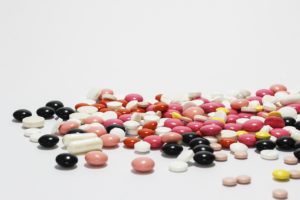Medication Intolerances 3 [Show Notes]

Tidbits about Headaches
A headache is an ambiguous side effect because there are so many different things that can cause headaches. Hormones are a big culprit of this. Blood pressure medications can too.
For someone with chronic high blood pressure, the higher pressure becomes the body’s new “normal”. Once medication starts to bring it down, even though the pressures are within a normal range, the body will experience symptoms of low blood pressure.
2 lies people tell about allergies
- No allergies – so then they take something they are allergic to and have an emergency
- Allergic to “everything” – because they experienced mild or moderate side effects. Or in the case of pain pill seekers, they’re “allergic” to the weak pain meds to get the doctor to prescribe stronger ones.
Stimulants
Irritability, nervousness, jitteriness, or moodiness can be a side effect of amphetamines (used for ADD) or cold medicines (i.e. pseudoephedrine).
A factoid about ADD/ADHD: the focus and attention area of the brain are underactive, so a stimulant helps it be more active so improve focus.
The biggest complaint people have from any stimulant is the inability to sleep at night. Just need to make sure it’s taken early enough in the day so it wears off in time for bed.
Bones and Joints
In this case, we rarely want you to keep taking the medication if these side effects happen. For example, cholesterol medications (i.e. statins, and fibrates) and quinolone antibiotics (Levaquin, Cipro, Avelox). The quinolones have a rare but serious side effect of tendon rupture; it is painful and permanent.
Tendons: the connective tissue that anchors muscles to the bones.
Osteoporosis medications can lead to bone pain – since their job is to cause changes in the way the bones are built and rebuilt, it’s not uncommon to feel something. But usually temporary.
Connect with me
Support us on Patreon
*NEW* Join the Pharmacist Answers Podcast Community on Facebook
Subscribe: iTunes, Stitcher, GooglePlay, TuneIn Radio
Music Credits: “Radio Martini” Kevin MacLeod (incompetech.com) Licensed under Creative Commons: By Attribution 3.0 http://creativecommons.org/licenses/by/3.0/
